

Vitamin D deficiency and myocardial diseases - Pilz - 2010 - Molecular Nutrition & Food Research. 1 Introduction Vitamin D deficiency is commonly observed in patients suffering from myocardial diseases 1.
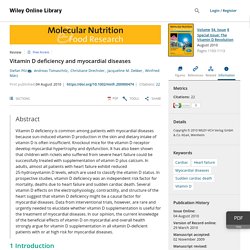
Sun exposure, which induces vitamin D production in the skin, is often limited in these symptomatic, housebound patients. This reduced ultraviolet‐B (UV‐B) radiation of the skin constitutes the main factor for the worldwide high prevalence of vitamin D deficiency because vitamin D intake by nutrition (e.g. eggs, fish or fortified food) is often too low to compensate for reduced dermal vitamin D production 2. In particular, elderly people are prone to vitamin D deficiency because the capacity of the skin to produce vitamin D decreases with aging and malnutrition is a frequent problem. Mounting evidence suggests that vitamin D deficiency is associated with increased cardiovascular risk and myocardial diseases, but the underlying mechanisms remain to be explored in detail 3.
The War Against Vitamin D – A Threat to Big Pharma. Comments by Brian Shilhavy Editor, Health Impact News Natural substances with tremendous healing capabilities that cannot be patented are a huge threat to the pharmaceutical industry and their FDA-approved drugs, and certainly vitamin D is at the top of this list.

For example, published scientific literature shows that vitamin D is more effective in preventing annual influenza than the dangerous flu shot. VitDstudyforveterinariansICCI website. Oral vitamin D supplementation at five times the recommended allowance marginally affects serum 25-hydroxyvitamin D concentrations in dogs. Serum 25‐hydroxyvitamin D concentrations in dogs – correlation with health and cancer risk - Selting - 2016 - Veterinary and Comparative Oncology.
Vitamin C reduces liver inflammation, which improves vitamin D production – Dec 2014. Received: 5 November 2014; Accepted: 15 November 2014 / Published: 1 December 2014 Nutrients 2014, 6(12), 5473-5499; doi:10.3390/nu6125473 (registering DOI) David Højland Ipsen, Pernille Tveden-Nyborg and Jens Lykkesfeldt jopl@sund.ku.dk(This article belongs to the Special Issue Nutrition and Liver Disease) Obesity and the subsequent reprogramming of the white adipose tissue are linked to human disease-complexes including metabolic syndrome and concurrent non-alcoholic fatty liver disease (NAFLD) and non-alcoholic steatohepatitis (NASH).
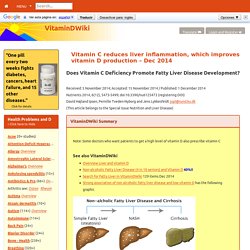
The dietary imposed dyslipidemia promotes redox imbalance by the generation of excess levels of reactive oxygen species and induces adipocyte dysfunction and reprogramming, leading to a low grade systemic inflammation and ectopic lipid deposition, e.g., in the liver, hereby promoting a vicious circle in which dietary factors initiate a metabolic change that further exacerbates the negative consequences of an adverse life-style. The coming of age of 1,25-dihydroxyvitamin D(3) analogs as immunomodulatory agents. - PubMed - NCBI. Immunomodulatory effects of vitamin D receptor ligands in autoimmune diseases. - PubMed - NCBI. Control of autoimmune diseases by the vitamin D endocrine system. - PubMed - NCBI. Vitamin D: Nutrient, Hormone, and Immunomodulator. - PubMed - NCBI. Can Vitamin D3 Heal Autoimmune Diseases? A major—far more than the standard recommended—dose of vitamin D3 could be one of the keys to treating the ever-skyrocketing incidence of autoimmune disease in this country, says Southern California-based Dr.
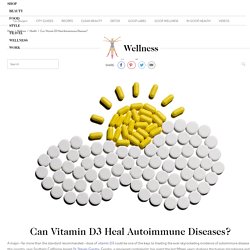
Steven Gundry. Gundry, a renowned cardiologist, has spent the last fifteen years studying the human microbiome and helping patients with autoimmunity (read about his fascinating transition here), and found that his autoimmune patients were almost always vitamin D deficient. High levels of vitamin D3, he says, help heal the gut issues he believes are the root cause of autoimmune disorders and other diseases as well. (For a primer on how vitamin D behaves—like a hormone in the body—see this previous goop piece.) Below, Gundry shares the surprising discoveries he’s made that have caused him to overturn what he learned about vitamin D in med school, and that underlie the high levels of vitamin D3 he recommends. I am convinced that all autoimmune disease begins and ends in the gut.
Video by Dr. Coimbra – 95 percent of auto-immune cured with vitamin D in high doses - April 2014. Speaking in Italian (with a Portuguese accent?)

Closed captions in any of 88+ languages Clinical interventions have shown that Vitamin D can prevent, treat, and even cure Multiple Sclerosis, at a tiny fraction of the cost of the drugs now used to treat it, and without side effects. Serum 25-hydroxyvitamin D concentrations in dogs - correlation with health and cancer risk. - PubMed - NCBI.
The effect of diet on serum 25-hydroxyvitamin D concentrations in dogs. - PubMed - NCBI. Oral vitamin D supplementation at five times the recommended allowance marginally affects serum 25-hydroxyvitamin D concentrations in dogs. - PubMed - NCBI. Dietary 135-fold cholecalciferol supplementation severely disturbs the endochondral ossification in growing dogs. - PubMed - NCBI. Vitamin D3 metabolism in dogs. - PubMed - NCBI. Current knowledge of vitamin D in dogs. - PubMed - NCBI. Clinical Review: The Role of the Parent Compound Vitamin D with Respect to Metabolism and Function: Why Clinical Dose Intervals Can Affect Clinical Outcomes. Vco12101.pdf;jsessionid 1E5A3A293722EAAEE824802772F6C2F3.
Vitamin D: not just bone, but also immunity. Coimbra protocol - High Doses of Vitamin D for autoimmune Diseases. Clinic for Autoimmune and Chronic Diseases. Material de apoio. Aqui você encontra uma espécie de “dossiê”, com artigos científicos e matérias jornalísticas falando sobre a relação da vitamina D com doenças autoimunitárias, em especial a esclerose múltipla, e também sobre outras questões que envolvem o tema, como os interesses financeiros da indústria farmacêutica.

Os benefícios da vitamina D (que na realidade é um pro-hormônio esteróide, não uma “vitamina”, conforme se sabe desde a década de 1930) para o combate à esclerose múltipla estão documentados em mais de 3.500 estudos publicados na literatura científica especializada (“Journal Sources”): Importante lembrar que há apenas 3 anos eram apenas 750 estudos publicados acumulados ao longo de mais de 40 anos de pesquisas, demonstrando a atenção rapidamente crescente que o meio científico tem dedicado ao assunto nos últimos anos. Seguem algumas publicações: A aparentemente inexplicável revolta ou indignação com que alguns profissionais [ou possíveis (?)
MMS: Error. Newly discovered effects of vitamin D on cancer - ScienceBlog.com. A team of researchers at McGill University have discovered a molecular basis for the potential cancer preventive effects of vitamin D.
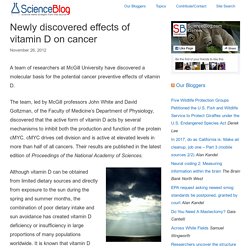
Vitamins D3 and K2 - The Dynamic Duo - Riordan Clinic. By Ron Hunninghake, MD Every fall, leading into winter, the sun sets further and further into the south.
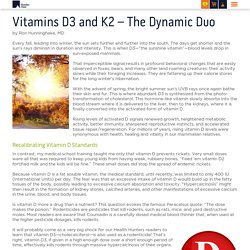
The days get shorter and the sun’s rays diminish in duration and intensity. This is when D3—”the sunshine vitamin”—blood levels drop in sun-exposed mammals. That imperceptible signal results in profound behavioral changes that are easily observed in foxes, bears, and many other land roaming creatures: their activity slows while their foraging increases. They are fattening up their calorie stores for the long winter’s hibernation. With the advent of spring, the bright summer sun’s UVB rays once again bathe their skin and fur. Toxic levels of vitamin D - Vit D Council July 2010.
Warning: If you intend to take massive doses of vitamin D based on this newsletter, which I highly recommend you do not, read the entire newsletter.

Take vitamin D3. VitaminDWiki. Report_VitD. Vitamin D Supplement News You Can Use. Vitamin D and Alzheimer’s disease. What is Alzheimer’s disease?

Alzheimer’s disease (AD) is a condition that causes memory problems and other cognitive functions that cause unpredictable changes in behavior. Usually, it’s progressive, which means it develops slowly and worsens over time. AD is the most common form of dementia. Dementia is the medical word used for loss of cognitive function that is serious enough to interfere with an individual’s daily life.
Currently, there is no cure for AD. There are two main changes that take place in the brain when an individual develops AD: Plaques, which are clusters of protein that build up between the nerve cells in the brain. What are the symptoms of Alzheimer’s disease? Some of the main symptoms are: These are different than some normal changes that happen as an individual ages, such as occasionally forgetting names or losing things from time to time.
How common is Alzheimer’s disease? www.grassrootshealth.net/media/download/12928garland021811.pdf. Vitamin D Action - Key Information and Resources. Page. Patent US7053074 - Prevention of ovarian cancer by administration of a Vitamin D compound - Google Patents. This application is a continuation of application 09/479,837 filed on Jan. 7, 2000, which is a continuation of application Ser. No. 08/873,010, filed on Jun. 11, 1997, now issued as S. Pat. No. 6,034,074, which is a continuation-in-part of U.S. Ser. No. 08/713,834 filed Sept. 13, 1996 now issued as U.S. Ovarian cancer is the fourth leading cause of cancer deaths among women in the United States and causes more deaths than all other gynecologic malignancies combined. Epithelial ovarian cancer is seldom encountered in women less than 35 years of age.
Previously, there has existed no established pharmaceutical approach to the prevention of ovarian cancer. cdn.intechopen.com/pdfs-wm/26797.pdf. Effects of Vitamin E on Cognitive Performance during Ageing and in Alzheimer’s Disease. 1. Introduction Free radicals are molecules containing a reactive unpaired electron. In biological models, the majority of free radicals contain an atom of oxygen and, therefore, are called reactive oxygen species (ROS) [1]. ROS are mainly produced in mitochondria and represent important regulators of cell signaling and cell cycle progression [2]. At high concentrations, however, ROS are detrimental and responsible for the biological damage that compromises cellular functions [3]. AD is a chronic, progressive neurodegenerative disorder characterized by a functional decline in memory and other cognitive capabilities [11,12]. Does Sufficient Evidence Exist to Support a Causal Association between Vitamin D Status and Cardiovascular Disease Risk? An Assessment Using Hill’s Criteria for Causality.
“Vitamin D and Human Health: from the Gamete to the Grave”: Report on a meeting held at Queen Mary University of London, 23rd–25th April 2014. Vitamin D and Cardiovascular Disease. 1. Introduction The main function of vitamin D relates to the development and maintenance of bone tissue. It is responsible for maintaining calcium and phosphorus homeostasis. Vitamin D insufficiency/deficiency has been observed worldwide at all stages of life. It has been characterized as a public health problem, since low concentrations of this vitamin has been linked to the pathogenesis of several chronic diseases with cardiovascular risk factors, such as hypertension, heart failure, atherosclerosis and peripheral arterial disease [1,2,3]. 2.
www.osakidetza.euskadi.net/contenidos/informacion/cevime_infac/eu_miez/adjuntos/INFAC_Vol_20_n_2.pdf. The role of vitamin D in reducing cancer risk and progression : Nature Reviews Cancer. The ASCO Post. By Kathleen M. Wesa, MD, and Barrie R. Cassileth, MS, PhD, Integrative Medicine Service, Memorial Sloan-Kettering Cancer Center, New YorkJune 25, 2013, Volume 4, Issue 10 Figures: Integrative Oncology is guest edited by Barrie R. Cassileth, MS, PhD, Chief of the Integrative Medicine Service and Laurance S. The Integrative Medicine Service at Memorial Sloan-Kettering Cancer Center developed and maintains a free website—About Herbs (www.mskcc.org/aboutherbs)—that provides objective and unbiased information about herbs, vitamins, minerals, and other dietary supplements, and unproved anticancer treatments. In addition, the About Herbs app, Memorial Sloan-Kettering Cancer Center’s very first mobile application, was launched last fall.
Linus Pauling Institute at Oregon State University. www.boneandcancerfoundation.org/pdfs/Vitamin_D_Booklet.pdf. What is the correct dose of vitamin D. Summary of dosing suggestions American Academy of Pediatrics recommends 400IU starting soon after birth and continuing through childhood and adolescence. 1000IU per day is the minimum dose that can be expected to significantly raise an adults Vitamin D level and is the current recommendation of the Canadian Cancer Society. 1000IU per day is considered conservative by experts in the field. Most experts suggest 2000 IU is appropriate and safe. (19) (for more on the safety of high dose Vitamin D click here) For older, obese, dark skinned or people who get very little sunshine, 2000IU may be the appropriate dose. (19)
Breast cancer and vitamin D. Summary Breast cancer is a malignant tumor, which is caused by a group of cancerous cells growing in the breast and into other areas around it. The stage of breast cancer depends on the size of the tumor, and if it has spread to other parts of the body. There are many things that can increase your chances of developing breast cancer. There are some things that you can’t change, like being female, and some things that you can change, like your weight or using birth control.
It is a combination of both genetics and lifestyle factors that increase your risk of developing breast cancer. Vitamin D the natural cancer cure. Senior pets rejuvenated with vitamin D. Breast cancer and vitamin D. Summary Breast cancer is a malignant tumor, which is caused by a group of cancerous cells growing in the breast and into other areas around it. The stage of breast cancer depends on the size of the tumor, and if it has spread to other parts of the body. Vitamin D Deficiency. Role of Nicotinamide in DNA Damage, Mutagenesis, and DNA Repair. How to Complete Your Home Vitamin D Blood Spot Test.